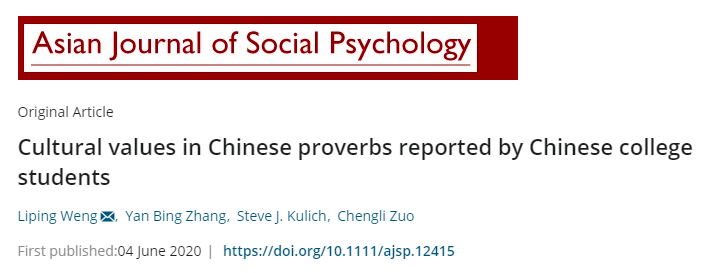
近日,跨文化研究中心副研究员翁立平以第一作者身份在SSCI期刊《亚洲社会心理学刊》(Asian Journal of Social Psychology)发表了题为“中国大学生自选熟语中的中国文化价值观”的学术论文(https://doi.org/10.1111/ajsp.12415)。该文是与研究中心高端外国专家、美国堪萨斯大学张雁冰教授合作完成的。《亚洲社会心理学刊》由亚洲社会心理学会主办、Wiley出版社出版,影响因子1.07。
作者对近300名中国大学生自选的千余条熟语进行梳理后,重点分析了100余条常用熟语所承载的中国文化价值观,共发现8个价值观主题:学问、勤奋、实干、群体取向、社会关系、美德、自由精神和乐观主义。随后,作者调查了另一群中国大学生的个体主义/群体主义取向、对上述价值观的认可度以及个体主义/群体主义取向与价值观认可度之间的关系。结果表明,该大学生群体对实干和学问的认可度最高,随后是勤奋、美德、社会关系、群体取向、乐观主义和自由精神。此外,尽管这些大学生的个体主义取向高于群体主义,群体主义对8个价值观的预测度更高。自选熟语为研究传统性和现代性的动态交互提供了洞见,研究结论反映了儒家和道家价值观的矛盾统一,以及传统、现代化与西方个体主义的杂糅,体现了当代中国大学生颇为复杂的社会心理。
文化与跨文化心理是我校外国语言文学双一流学科建设中跨文化研究方向的四大主题之一,此外还有跨文化交际、跨文化教育与跨文化传播。
ABSTRACT
Proverbs listed by Chinese college students, who are often at the leading edge of cultural change, provide a window into the dynamic interplay of traditionality and modernity. Using thematic analysis, Study 1 examined popular proverbs listed frequently by Chinese college students (n = 298) and the embedded values. Study 2, which was a survey, examined Chinese college students’ (n = 240) endorsement of individualism, collectivism, and the values identified in Study 1, and the predictive associations of individualism and collectivism with the values. Findings in Study 1 revealed 103 frequently listed proverbs and eight embedded values (i.e., Learnedness, Diligence, Practical Orientation, Collective Orientation, Social Relationship, Moral Virtue, Free Spirit, and Optimism). Findings in Study 2 indicated participants endorsed Practical Orientation and Learnedness the most, followed by Diligence, Moral Virtue, Social Relationship, Collective Orientation, Optimism, and Free Spirit. Furthermore, although Chinese young adults are more individualistic than collectivistic, collectivism remains a stronger predictor of the values uncovered in the proverbs. The value dynamics in general revealed tensions and harmony between Confucianism and Daoism and the hybridisation of tradition, modernisation, and Western individualism, thus reflecting the complexity of Chinese young adults’ social psychology.